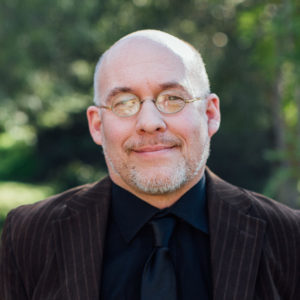
When you taste well prepared sushi, a McDonalds fish filet just isn’t so great. That’s what our guest today Grant Horner says when he talks about moving from being bored to having the fire of curiosity awakened in us…Listen in…
 Grant Horner‘s academic specialty at the Master’s University is the literature, theology, visual art, and philosophy of the Renaissance and Reformation, with primary concentration in Milton, Shakespeare, Erasmus, Luther, Calvin and late sixteenth- and seventeenth-century intellectual and cultural history. His research and writing has focused on Christian humanism in the Reformation, particularly the complex relationship between developing Reformed thought and classical Graeco-Roman pagan mythology, rhetoric, and philosophy. At Duke University he was taught and mentored by Stanley Fish, America’s leading literary theorist. His PhD dissertation was on the theological relationship between John Milton and John Calvin. He has written on the citation of classical Greek and Latin authorities by Renaissance writers, published academic essays on theology and the arts, and his first book, Meaning at the Movies, on film and theology (Crossway, 2010) was an Amazon bestseller and nominated for Book of the Year in Christianity and Culture by the Book Retailers Association. His second book, John Milton, Classical Learning, and the Progress of Virtue was published by Classical Academic Press in 2015. Two more books on John Milton are forthcoming. Professor Horner is the founder and director of the Master’s University in Italy Program, a six-week summer intensive study abroad semester. Students live in an ancient villa near the city that was the birthplace of the modern world in the Renaissance, incomparable Florence, and also spend time in Rome and Venice. A variety of humanities courses revolve around the Renaissance humanist’s question quid est homo?—”what is man?” We consider the basis of and goal for studying the humanities and explore what it means to be human.
Grant Horner‘s academic specialty at the Master’s University is the literature, theology, visual art, and philosophy of the Renaissance and Reformation, with primary concentration in Milton, Shakespeare, Erasmus, Luther, Calvin and late sixteenth- and seventeenth-century intellectual and cultural history. His research and writing has focused on Christian humanism in the Reformation, particularly the complex relationship between developing Reformed thought and classical Graeco-Roman pagan mythology, rhetoric, and philosophy. At Duke University he was taught and mentored by Stanley Fish, America’s leading literary theorist. His PhD dissertation was on the theological relationship between John Milton and John Calvin. He has written on the citation of classical Greek and Latin authorities by Renaissance writers, published academic essays on theology and the arts, and his first book, Meaning at the Movies, on film and theology (Crossway, 2010) was an Amazon bestseller and nominated for Book of the Year in Christianity and Culture by the Book Retailers Association. His second book, John Milton, Classical Learning, and the Progress of Virtue was published by Classical Academic Press in 2015. Two more books on John Milton are forthcoming. Professor Horner is the founder and director of the Master’s University in Italy Program, a six-week summer intensive study abroad semester. Students live in an ancient villa near the city that was the birthplace of the modern world in the Renaissance, incomparable Florence, and also spend time in Rome and Venice. A variety of humanities courses revolve around the Renaissance humanist’s question quid est homo?—”what is man?” We consider the basis of and goal for studying the humanities and explore what it means to be human.
